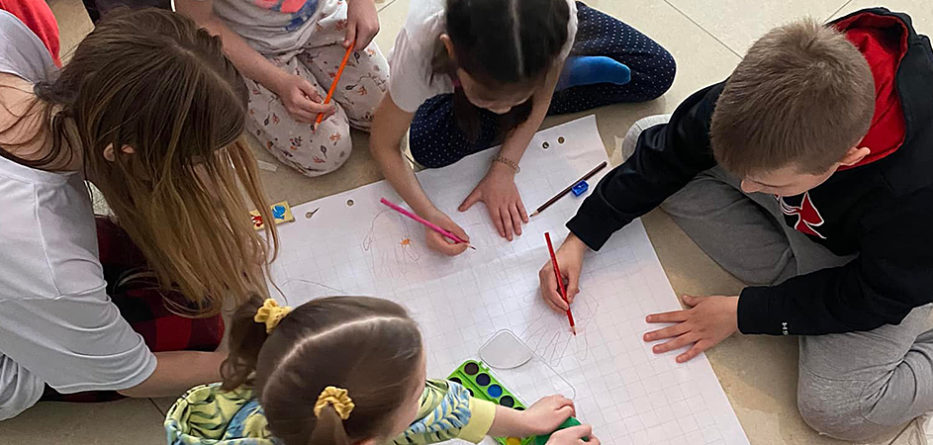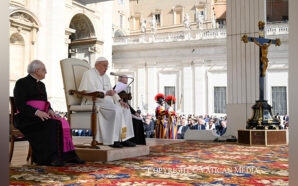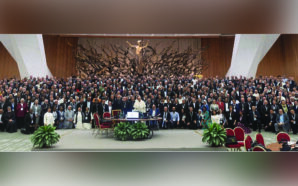In the initial days after Russia’s invasion of Ukraine, over 2,000 refugees found refuge and hospitality in the convent of the Little Servants of the Immaculate Conception of the Blessed Virgin Mary of Stara Wieś, in Poland.
The Little Servants of the Immaculate Conception of the Blessed Virgin Mary of Stara Wieś live in the Polish city of Przemyśl, 12 kilometres from the border with Ukraine.
Ever since the first hours following the outbreak of the war, they have been committed to helping refugees from Ukraine.
Sister Ewa Mehal recounts: “On the first day of war we began giving out sandwiches, bigos and hot drinks at the border, the train station and the refugee centre. Many people were bringing food for the refugees, but we realized that these people were sleeping in the station. We worried above all about guaranteeing housing to mothers with small children, to the elderly and to people with disabilities. We would go to the train station, where refugees camped out while they waited for the trains, and we would invite them to spend the night with us. We would drive them to our house in our car”.
That was not easy, however, because they were being invited by people who were complete strangers to them. “We had to earn their trust. We had to break down walls, win these people’s trust, because not all of them wanted to go sleep in an unfamiliar place. They were worried about what would happen next, far away from the station, because they wanted to be close to the border,” recalls Sister Ewa.
First aid
Sister Ewa Mehal describes offering the first forms of aid to the frightened and hungry refugees from Ukraine.
“The first thing was a hot meal; that was the starting point. Then a bathroom to wash up and a place to spend the night. At the same time we also set up a storage unit to have the essentials on hand, because there were many benefactors from Poland and abroad. We would ask these people what they most needed to continue on their journey. Some arrived, exhausted, telling us that they had not showered in days. Some came directly from the shelters.”
Mothers with small children
“Mothers with small children found themselves in the most difficult situation. The youngest child was three weeks old. We had to create special conditions for these mothers, and the newborns needed special care. We built a playground in the courtyard. Sometimes the families arrived late in the evening, and the children didn’t want to go inside the house but would immediately start playing in the courtyard,” says Sister Mehal.
The Sister also remembers their outings at night: “Sometimes, we would go to the station at midnight if there was someone in need. In these cases, it was often related to small children. The volunteers would call us from the station saying that there was a family or a mother with several children who had no place to sleep. We would bring them home. Then we would take them back to the train they wanted to catch to continue on their journey.”
All the sisters were involved in helping refugees
“Due to the large number of refugees continuously arriving at the house of Przemyśl (around 40 people per day), our sisters from the other houses of the Congregation supported us. They travelled to Przemyśl to help the refugees. Among them were three sisters who work in Ukraine and whom the war surprised in Poland: Sister Krystyna, Sister Łucja and Sister Irina. Their knowledge of the Ukrainian language helped to communicate with the refugees,” shares Sister Mehal.
Such fast and efficient organization of aid was possible thanks to the involvement of many people.
Sister Ewa Mehal highlights that “all the sisters — be they in Poland or abroad, including in Ukraine — were involved in helping the refugees through prayer and service, making donations of money and material goods, organizing collections and participating in initiatives. They also coordinated transportation for food, clothes, medicine, medical supplies and hygiene products”.
Gratitude
The people who received this assistance are very grateful. The following is one of the emails some of them sent to the sisters in Ukraine who were the first to offer them aid in their home.
“We would like to thank the Sisters from the bottom of our heart for the aid they offered to us on our journey toward our new home in England. The opportunity to live with you deepened our faith in human beings. Despite the difficult moments we experienced, we were able to catch a glimpse of an outstretched hand. We, the whole family, are very grateful to you for the help you offered us. For us it was also an experience of God’s love and of his presence in our life. He does not abandon us, but especially in difficult moments, he sent us his angels who took care of us. Taras.”
There are many thank-yous like this one.
The sister’s aid in Poland
Over 1,000 homes run by women religious in Poland have been involved in providing some form of assistance to refugees since the beginning of the conflict in Ukraine.
In addition to the activities in Poland, 154 Polish sisters — that is, 40 percent of the total number of sisters present in Ukraine — carry out their ministry in Ukraine.
Recent data collected by the Consulta delle Congregazioni Religiose Femminili (Council of Women’s Religious Congregations) shows that Ukrainians are currently present in 213 religious houses and centres.
Those who wish to support the sisters providing aid to the people of Ukraine can contact the Council of Women’s Religious Congregations.
With thanks to Vatican News and Paweł Rytel-Andrianik, where this article originally appeared.








